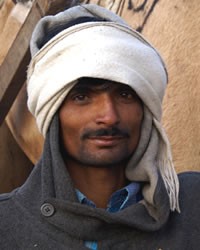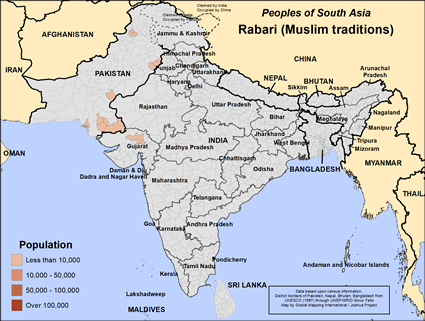The name "Rabari" translates to "outsider", and there is a good reason. Traditionally the Rabari people were nomadic, outsiders to any settle community. They are noted for herding camels, and sometimes associated with the gypsies. They might have their origins in Iran and other parts of Central Asia, but no one knows for sure.
Traditionally all of them were Hindu, though a minority converted to Islam. People usually assume they are Hindu since the Muslims are such a small number.
Muslim Rabari people in India live in Gujarat, a state that borders Pakistan. Other Muslim Rabaris live in Pakistan.
Rabari women have been noted for their fine embroidery for centuries. Girls learn embroidery at a young age and collect either the cloth or the money by selling it for their dowry. Rabari women do not have inheritance rights to parental property. They are mostly engaged in household work and looking after milk cows, etc. while the men tend to the livestock. However, women are closely involved with important family decisions.
Like most peoples in India, daughters do not have rights of inheritance; that is reserved for their brothers. The Rabaris have 133 subgroups. They only marry within their people group. They practice both child and adult marriage.
Most Rabari people are settled on the outskirts of town. They live semi-nomadic or settled lives now, unlike their ancestors who were completely nomadic.
Muslim Rabari people are Sunni, the largest branch of Islam. They believe that the One, Supreme God, Allah, spoken through his prophet, Mohammed, and taught mankind how to live a righteous life through the Koran and the Hadith. To live a righteous life, you must utter the Shahada (a statement of faith), pray five times a day facing Mecca, fast from sunup to sundown during the month of Ramadan, give alms to the poor, and make a pilgrimage to Mecca if you have the means. Muslims are prohibited from drinking alcohol, eating pork, gambling, stealing, slandering, and making idols. They gather for corporate prayer on Friday afternoons at a mosque, their place of worship. The two main holidays for Sunni Muslims are Eid al Fitr, the breaking of the monthly fast and Eid al Adha, the celebration of Abraham's willingness to sacrifice his son to Allah.
In most of the Muslim world, peoples like the Rabari depend on the spirit world for their daily needs since they regard Allah as too distant. Allah may determine their eternal salvation, but the spirits determine how well we live in our daily lives. For that reason, they must appease the spirits. The often use charms and amulets to help them with spiritual forces.
The Rabari people, be they Hindu or Muslim, need to put their faith in Jesus Christ, the only one who can bless them with abundant life and eternal salvation from sin and death.
Pray for the Holy Spirit to give Muslim Rabari people teachable and understanding hearts.
Pray that a strong movement of the Holy Spirit will bring entire Rabari families into a rich experience of God's blessing.
Pray for Rabari families to be drawn by the Holy Spirit to seek forgiveness, and to understand the adequacy of Christ's work on the cross.
Pray for teams of believers to do sustained, focused prayer for the Lord to open the hearts of Rabari family leaders to experience God's blessing through a movement of family-based discovery Bible studies.
Scripture Prayers for the Rabari (Muslim traditions) in India.
https://joshuaproject.net/people_groups/17666/IN
https://kashgar.com.au/blogs/tribal-culture/rabari-people-of-northwest-india
https://joshuaproject.net/people_groups/17666/PK
https://www.atlasofhumanity.com/rabari
http://indiahistoryspeaks.blogspot.com/2008/07/rabaris-of-kutch.html
| Profile Source: Keith Carey |











